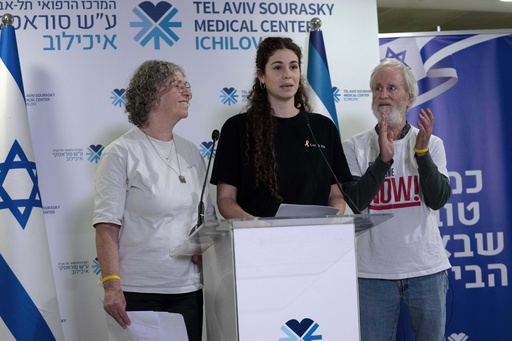
TEL AVIV, Israel — During the last two months of his time in Gaza, Keith Siegel, an American-Israeli, was confined to a small room where he was forced to lie down constantly. He described the dire conditions he faced, including limited access to electricity and running water, which made personal hygiene extremely challenging.
Upon returning to Israel last week, Siegel appeared thin and weary. His brother Lee recounted that his first words were, “I’m back, I’m home.” Almost immediately, he inquired, “What can I do to help bring the other hostages home?”
As hostages are being freed after 15 months of captivity due to a ceasefire agreement between Israel and Hamas, more details about their harrowing experiences are surfacing. These accounts, primarily relayed through the victims’ families, are illuminating the hardships faced by approximately 75 remaining captives in Gaza and are motivating relatives to continue advocating for their loved ones until all are released.
Aviva Siegel, Keith’s wife and herself a former hostage, told reporters that she and her family have tirelessly campaigned across the globe to keep their story visible. “We must not rest. We must not turn away,” she emphasized, insisting that the remaining hostages deserve better treatment and attention.
Following the devastating conflict that erupted after Hamas’s attack on October 7, 2023, which resulted in the deaths of about 1,200 people and the abduction of 251 hostages, a ceasefire pact was established last month. Currently, around 75 hostages are believed to still be held in Gaza, while Israel presumes that roughly half of them may be deceased.
The situation for Palestinians has also been dire, with reports from the Gaza Health Ministry indicating that over 47,000 Palestinians have lost their lives amidst the hostilities. The statistics do not categorize individuals as civilians or combatants but state that a significant number of fatalities involve women and children. The first phase of the ceasefire outlines a halt in confrontations, the release of hostages, and an increase in humanitarian aid to Gaza, with three additional hostages expected to be freed this Saturday.
The families of the hostages and their advocates are actively working to ensure that the plight of the captives remains in the public eye, emphasizing their urgent need for freedom. However, the extension of the ceasefire remains uncertain, hinging on renewed negotiations between Israel and Hamas, which are essential for entering a second phase of the agreement that would enable the release of more hostages.
Keith Siegel, who is 65 years old and hails from Chapel Hill, North Carolina, was captured along with his wife Aviva during the Hamas assault on Kibbutz Kfar Aza—one of the locations severely impacted by the attack. Aviva was released during a brief ceasefire period in November 2023.
Lee Siegel, 73, shared that Keith had been moved frequently during his captivity, spending around six months isolated from other hostages. His access to information was negligible, consisting of occasional snippets from radio or television broadcasts.
During lengthy periods of enforced silence, Keith used his meditation skills to maintain some semblance of mental stability. He tracked time by reciting the date and day of the week daily. On occasions when he was allowed to speak, he would whisper messages of love to his family or hold silent conversations in his thoughts, imagining affirmations for his family.
As he gradually begins to recount his harrowing experiences, Lee acknowledged that the family struggles to fully grasp the extent of his suffering. Returning home also means dealing with significant changes that occurred while Keith was away, including personal family milestones and the alteration of life in Israel. Lee commented, “It’s a human being who was taken for 484 days, suffering the worst things we can appreciate.”
Romi Gonen, another individual released during the ceasefire, now faces the need for complex surgery and extensive rehabilitation due to an untreated hand injury incurred during the initial attack. Her mother, Meirav Leshem Gonen, noted the toll captivity took on her daughter’s health; she lost a significant amount of weight and struggled to adjust back to normal life, including recognizing hunger.
Gonen’s journey back to normalcy has been slow, with her preferred method of coping being to share light-hearted anecdotes during a grim period. Meirav has continued to advocate for the hostages, appealing for ongoing action to extend the ceasefire for the remaining captives.
Meanwhile, Lee Siegel’s family is taking a step back to spend time together and support Keith. Despite the long path ahead towards his emotional and physical recovery, Lee expressed confidence in his brother’s resilience, stating that Keith’s strength inspires those around him. “Actually, I think he provides us with more strength than we can provide for him,” he remarked.

